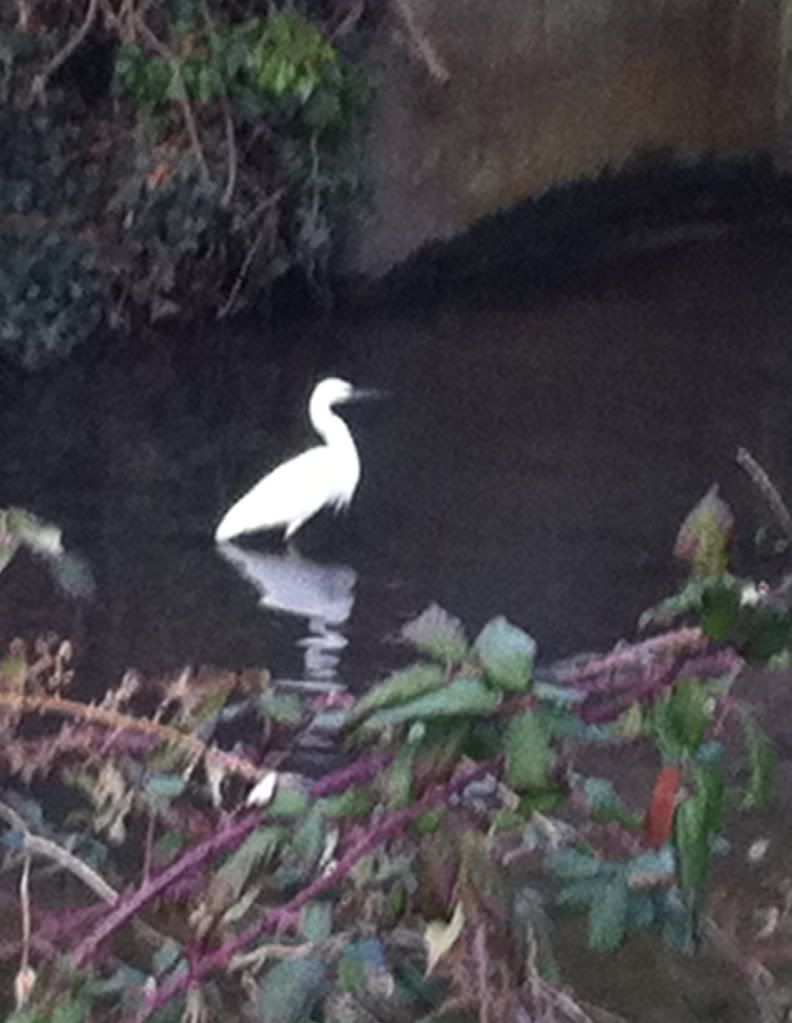
Little Egret, Tiffey, 10 March 2012
C suggests a walk. It is always her suggestion and most times I don't feel like it at first, even while knowing it is good for me. I spend too much time sitting, reading, thinking, writing. Exercising the legs and lungs is sound philosophy and good practical advice, yet I resist it. Why?
But I always say yes, in fact almost immediately. I am, I think, an infinitely amenable creature almost to the point of passivity. You want to do that? OK, let's do it. You want to turn right? Fine, let's turn right. Shall we dance? Yeh, let's dance. It's the head where things are buzzing and flying. Frankly, I am surprised I am no flabbier, no creakier than I am. I run up stairs two at a time. I find it easier that way.
Once out I notice the air. It feels good generally, simply by being other than the air of the room. The street is familiar and the walks are familiar. We go together, talking, watching, occasionally taking each other's hand or throwing an arm round the other's waist. Sometimes C skips about just loosening up and I smile at her.
At some point, especially in the last few years, the outside world becomes noticeably multifarious. It has a crispness and pathos and brightness, a sort of emergent quality. We pass by the abbey and down towards the river, or beyond it to the great cedar of lebanon at the end of the further path, as we did today. A hedgerow either side thinning in places. Tufts of almost lush looking grass, the abbey to our left in the middle distance. The hedge is cut back, bare twigs strong and white, cut into smooth stumps. Then the birdsong becomes clearer. I don't know much about birdsong, but the blackbird's extraordinary richness of song is clear enough. A 'sculptured fioratura, clean as a whistle', I called it in a poem dedicated to C's father a decade or so before he died. The phrase comes to mind again, the pleasure of saying the word fioratura, so much like whistling, at the heart of it. Then the chiff-chaff, the coarse cawing of rooks as they nest, an old tyre in the field, the new buds just appearing, and then, as we come round to the river again, quite suddenly, something that hasn't been there before, curled like a miniature swan in the water, a beautiful white calligraphic shape. It's an egret, probably a little egret. It fishes and plunges, undisturbed. We gaze at it. C takes a photo on her phone. Eventually it flutters a few yards and lands on the far bank, uncurls its neck and stretches it.
After that the whole walk feels more buoyant, even a little luminous. Everything has clearer edges, is crisper still.
These impressions strike deeper and sharper now than they ever did. As if life were ever more a precipice, the air a touch rarer and more dizzying. It is as if one were slowly becoming oneself, more the shape of being, but seen, of course, at some distance, as an object in space, like any other object. It is a form of understanding, even if what we understand is simply that what we are understanding may be no more than the act of understanding itself, and how little that means, and how good it is to understand at least that much.
So we walk home and arrive at the house and I go back to my desk. I send C's photograph of the egret to Mark, to check it's a Little Egret. He confirms it is and says they are very common in Hungary and growing more common in England since the 90s.
Small angels of history. Small archaic torsos. Rilke's terrible angels. 'You must change your life'. But look, it is changing, moving.

3 comments:
Beautiful piece. Very evocative, written with a true poet's limpid, pellucid prose. The description is breathtaking. Truly a privilege reading this.
Oh wow, George! I have been feeling rather depressed (not particularly unusual for me!) and this piece struck through the dark sphere like a hand, thrusting the spear of truth and light and shattering the shadows.
Thank you! Thank you so much!
I thought you might be amused to see my first response to these elegant birds (which we had not seen until we moved from Cambridge to South Wales) ... here on The Poetry Library/South Bank Centre site. Incidentally, I now live in Suffolk, and have had the joy of watching them here, too.
Post a Comment